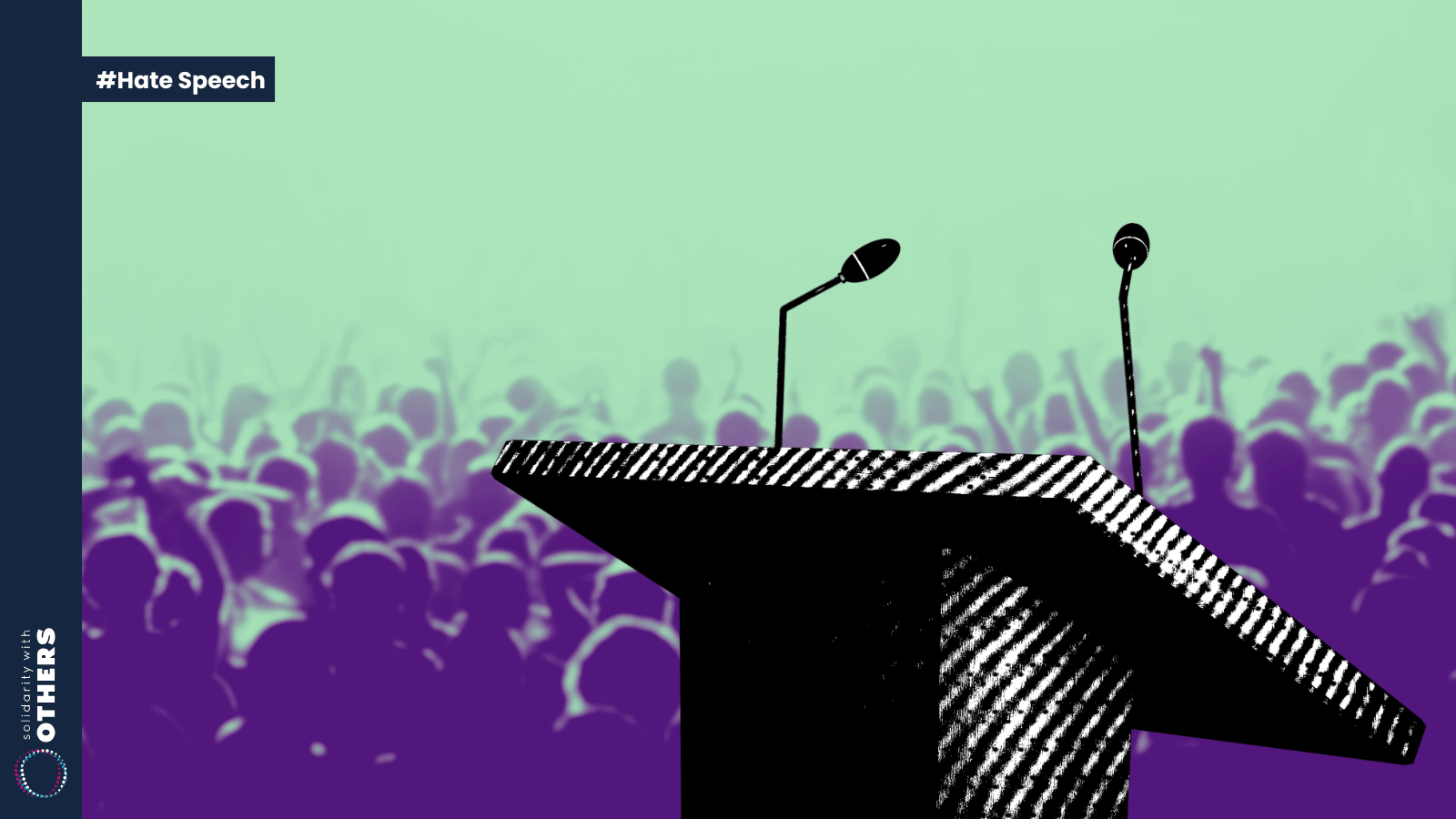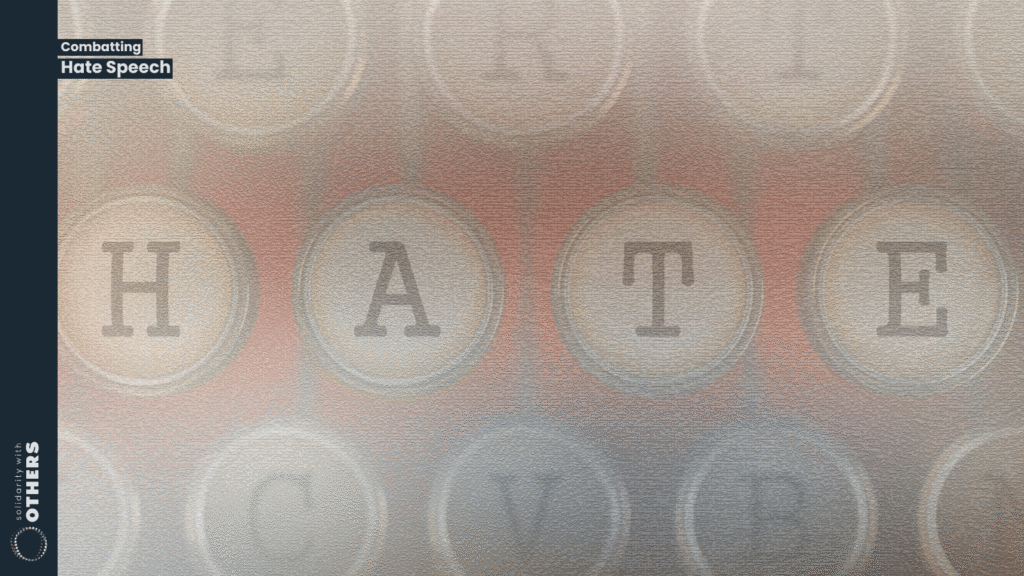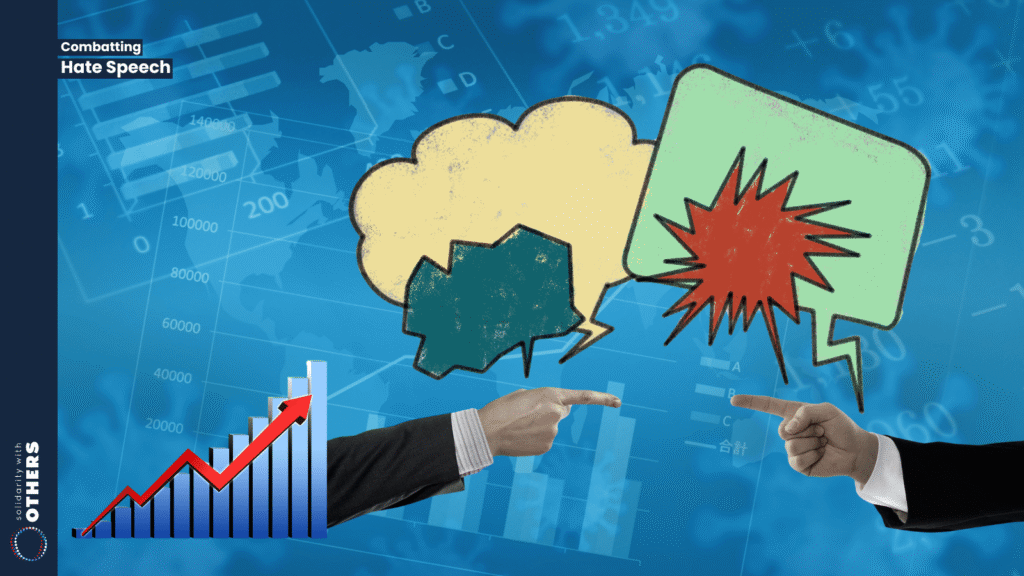As those who follow current political developments are aware, in recent years, right-wing populist and nationalist leaders have gained prominence on the political stage. This rise has led to an increase in hate speech, as populism thrives on divisive politics. In Turkey, President Recep Tayyip Erdoğan’s provocative statements targeting his opponents, in the United States, Donald Trump’s anti-immigrant rhetoric, and in Europe, the refugee-hostile discourse of far-right parties—though contextually distinct—ultimately serve the same fundamental purpose due to the similarity in the language employed: social unrest.
In this post, we will take a closer look at populist leaders—especially U.S. President Donald Trump and Turkish President Recep Tayyip Erdoğan—focusing on the divisive language they use and how this rhetoric contributes to rising authoritarianism.
Populist Politics and the Us-Them Divide
The term “populism,” derived from Latin, literally means “people-ism.” Politically, however, populism refers to the method of spreading ideas by strengthening and mobilizing one’s own base through the creation of an enemy or the “other.” Populism can be found in both right-wing and left-wing political movements. In this sense, Viktor Orbán, who built barbed wire fences on the border to prevent the passage of Syrian and Iraqi migrants and labeled Muslim refugees as “invaders,” is an example of a right-wing populist leader.[1] On the other hand, Hugo Chávez, who defended the poor in Venezuela while portraying elites and large capital groups as the enemy of the people, accused large landowners and businesspeople of being “parasitic elites” and nationalized agricultural lands and major corporations, is an example of a left-wing populist leader.[2]
As can be seen, whether rooted in nationalist right-wing politics or socialist left-wing movements, the core of populist politics lies in the “us versus them” dichotomy. In Viktor Orbán’s rhetoric, the “us” refers to Europeans, whereas in Chávez’s discourse, it manifests as the impoverished masses. Although the reasons for their emergence and the social dynamics they stem from may differ, the fundamental narrative of populist leaders is always built upon the polarization between the “real people” and the “other.”
One of the most striking examples of this “us versus them” divide can be found in the political rhetoric of current U.S. President Donald Trump. Through his polarizing discourse—particularly targeting immigrants, Muslims, and political opponents—Trump has deepened this division and created fertile ground for the spread of hate speech.
Trump’s “Us Versus Them” Politics: A Threat to Democracy
Since first coming to power in 2016, U.S. President Donald Trump has employed a distinctly populist rhetoric. His speech at the “Save America!” rally on January 6, 2021, serves as a clear summary of the populist narrative he pursued. Using demagoguery as a weapon to incite the masses, Trump defined the crowd at his rally as “the people,” glorifying them with statements such as, “You’re stronger, you’re smarter. You’ve got more going than anybody.” In this context, the “you” he referred to was the “forgotten, patriotic people who founded the American nation,” while the “others” were presented as the corrupt media and elites.[3]
A characteristic feature frequently observed in the rhetoric of many other populist politicians is also prominent here: the portrayal of the group identified as “us” as victims. According to Trump, “the people” are being wronged by a corrupt media. This narrative of victimhood inevitably brings with it the concept of an enemy, which, in this case, is the media.[4]
However, the enemy is not limited to the media—this list grows endlessly. The constant presence of an enemy led Trump’s supporters to perceive their country as under siege and served to consolidate his voter base. Drawing its momentum from the creation of a perpetual crisis atmosphere, right-wing populist leader Trump has, at various times, vilified immigrants, Muslims, women, and LGBTI individuals by making them subjects of hate speech. In the “us versus them” dichotomy Trump constructs, simply being an American citizen is not sufficient to be part of the “us.” One must also be white and Christian—something clearly reflected in his 2019 statement directed at four female Democratic members of Congress who were U.S. citizens: “Go back to the country you came from.”[5]
Among the groups most frequently targeted by hate during Trump’s administration were Muslims. So much so that, during his 2015 presidential campaign, Trump went so far as to call for “a total and complete shutdown of Muslims entering the United States.”[6]
These examples could easily be multiplied. One of the key points I wish to highlight is that the language used by a head of state does not merely divide society—it can also lead to hate crimes. A study conducted in the United States examined the impact of Donald Trump’s 2016 presidential victory on hate crimes across the country. The findings revealed a significant increase in hate crimes, particularly those targeting Muslim and Latin American immigrants, following Trump’s election.[7]
One of the key dangers of populist politics is that populist leaders often abandon the principles they loudly defend as soon as those principles no longer serve their personal or political interests. This contradiction is a common strategy: stirring emotions to rally public support, appearing ideologically firm at first, but then quickly changing or even reversing course once in power.
Donald Trump, for example, often spoke about the importance of press freedom and free speech during his election campaign, portraying himself as a champion of these values. But in recent weeks, we have seen many people’s freedom of expression restricted simply for criticizing the U.S. government’s stance on Palestine. The Trump administration has started targeting pro-Palestinian protests, including arresting and deporting students. One striking case is that of Rumeysa Öztürk, a Turkish PhD student in the U.S. on a Fulbright scholarship, who was detained by immigration officers just for writing an article in her school newspaper supporting Palestine. Her U.S. visa was also revoked.[8]
Similarly, the dismissal of Professor Cemal Kafadar, Director of the Center for Middle Eastern Studies (CMES) at Harvard University, and his deputy Rosie Bsheer, following events related to the Israel-Palestine issue—under accusations of antisemitism—is yet another example that highlights how academic freedom of expression is under pressure.[9]
Erdoğan’s Polarizing Rhetoric and the Repercussions of Hate Speech
Recep Tayyip Erdoğan’s rhetoric, much like Donald Trump’s political style, relies on the “us versus them” dichotomy and a strategy of demonization. Just as Trump targeted Muslims, the media, and elites, Erdoğan has consistently labeled various groups as the “other” to consolidate his power. However, one striking difference in Erdoğan’s rhetoric stands out: the ever-shifting identity of the enemy.
Throughout his political career, the groups Erdoğan has branded as “terrorists” or “traitors” have evolved according to his political needs. After the 2013 Gezi protests, he vilified demonstrators as “marginal looters (çapulcular)” and blamed the “interest rate lobby.” Following the 2016 coup attempt, the Gülen movement—stigmatized as “FETÖ”—became the primary enemy, a narrative later expanded to include HDP politicians and the Kurdish movement. This demonstrates how populist leaders can flexibly redefine their enemies. Moreover, whether the accused individuals actually have ties to these groups is irrelevant. The case of journalist Ahmet Şık is a glaring example: arrested in 2011 as part of the Ergenekon investigation, Şık was later accused in 2016 of ties to “FETÖ.” This contradiction exposes how definitions of “enemies” are shaped by political expediency and weaponized regardless of facts.
Erdoğan’s polarizing language has gradually been adopted by the opposition as well. After 2016, the rhetoric of “fighting FETÖ” became a common refrain across nearly all political parties. Politics devolved into a competition over “who could be more anti-FETÖ.”[10]
This climate of repression led to the opposition’s complicit silence amid systemic abuses. The mass dismissal of tens of thousands of civil servants without due process, confiscation of their assets, and UN-documented torture cases[11] were either willfully ignored or actively endorsed by opposition parties. The pervasive fear of being branded as “FETÖ collaborators” not only stifled any meaningful defense of constitutional principles, but allowed Erdoğan’s rhetorical hegemony to completely neutralize political opposition.
Erdoğan’s hate speech has gradually transformed not just political actors, but the very fabric of public discourse itself. The uncritical adoption of the “FETÖ” label in both media and everyday language demonstrates how demonization has become normalized in Turkish society.[12]
This reality lays bare the success of Erdoğan’s populist rhetoric. As close observers of Turkish politics will note, it’s not just AKP supporters – the entire political spectrum now operates within the discursive boundaries Erdoğan has set. In this sense, he has consolidated his narrative dominance by forcing not just his supporters, but his opponents as well, to play by his rhetorical rules.
CONCLUSION:
The hate speech employed by populist leaders serves as a mechanism that deepens social divisions while paving the way for authoritarianism and the erosion of rule of law. As demonstrated by both Trump and Erdoğan, this “us versus them” framework doesn’t merely fuel polarization – it systematically corrodes democratic institutions from within. Ultimately, where hate becomes politicized, the law falls silent – leaving behind governance reduced to the whims of raw power.
[1] https://www.politico.eu/article/viktor-orban-hungary-doesnt-want-muslim-invaders
[2] https://www.france24.com/en/20110319-nationalisation-chavez-venezuela-trade-expropriation-firms-foreign-companies
[3] https://theconversation.com/how-donald-trumps-populist-narrative-led-directly-to-the-assault-on-the-us-capitol-153277
[4] https://www.theguardian.com/us-news/2018/aug/03/sanders-trump-acosta-media-enemy
[5] https://www.nytimes.com/2019/07/14/us/politics/trump-twitter-squad-congress.html
[6]https://www.washingtonpost.com/news/post-politics/wp/2015/12/07/donald-trump-calls-for-total-and-complete-shutdown-of-muslims-entering-the-united-states/?noredirect=on
[7] Edwards, Griffin Sims, and Stephen Rushin. “The effect of President Trump’s election on hate crimes. (2018)
[8] https://www.theguardian.com/us-news/2025/mar/30/trump-crackdown-free-speech
[9] https://www.agos.com.tr/tr/yazi/32279/harvard-universitesi-prof-dr-cemal-kafadar-i-gorevden-aldi
[10] Examples of this rhetoric, which dominates Turkish politics and targets the Gülen movement, can be found at: https://hatemonitoring.com/
[11] https://digitallibrary.un.org/record/3843477?v=pdf&ref=%5B%27%5B%22%5B%5C%27iahrageneva.com%5C%27%5D%22%5D%27%5D&ln=fr#files
[12] https://internationaljournalists.org/medyanin-haber-dili-ve-devlet-gudumlu-feto-nefret-soylemi/





